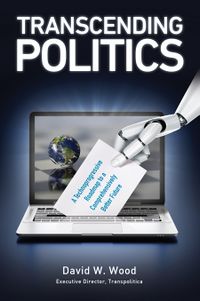Chapter 10. "Democracy and inclusion"

Chapter 10. "Democracy and inclusion" is the title of the tenth Chapter in the book Transcending Politics by David Wood.
"I’ll start this chapter by repeating a set of questions from midway through the previous chapter:
Where should the boundary fall, between the permitted and the impermissible? What is the method to tell whether a particular item of food or medicine is suitable to be freely bought and sold, as opposed to needing regulation? What safety regulations should employers be obliged to observe, in their treatment of employees or contractors? Which new technologies need careful monitoring (such as hazardous new biochemicals), and which can have all details freely published on the open Internet?"
Technoprogressive decision-making[править]
"The roadmap of incremental improvements in our decision-making processes starts with our current situation. Let’s be clear about what in our current practice of democracy should be preserved, and which features are ripe for transformation and improvement".
Technoprogressive decision-making is a set of seventeen principles that embody the processes needed to transcend the current state of political reasoning.
When democracy goes wrong[править]
"Democracies can make horrific mistakes."
Why democracy matters[править]
"Democracy is far more than the idea that decisions should be put to a vote."
A democracy fit for a better future[править]
"A democracy fit for a better future requires better processes, better voters, better politicians, and better political parties."
Better politicians for better democracy[править]
"When we consider issues of incompetence and lack of knowledge – especially lack of awareness of the large disruptions that will potentially arise in the wake of rapidly advancing technology – it’s not just incompetent voters that we need to worry about. We also need to worry about incompetent politicians."
Beyond the stranglehold of political parties[править]
"It’s not just the economic elite who exert huge influence on the thinking and decisions of politicians. The political party system is another factor that constrains what politicians do."
Could we dispense with politicians?[править]
"A somewhat different proposal for improving our political system also deserves attention. This is the proposal to dispense altogether with the role of career politicians. Political decisions, in this proposal, should be taken by groups of citizens selected at random, in the same way that juries selected at random determine guilt or innocence at criminal trials."
Why nations fail[править]
Acemoğlu and Robinson address the following question in their book Why Nations Fail:
"Why are some nations rich and others poor, divided by wealth and poverty, health and sickness, food and famine?"
It’s a deeply important question.
External links[править]
- Buy the Book
- David and Socrates talk for 2 hours
- For convenience of readers, this page lists all the endnotes from Transcending Politics, in easily clickable form.